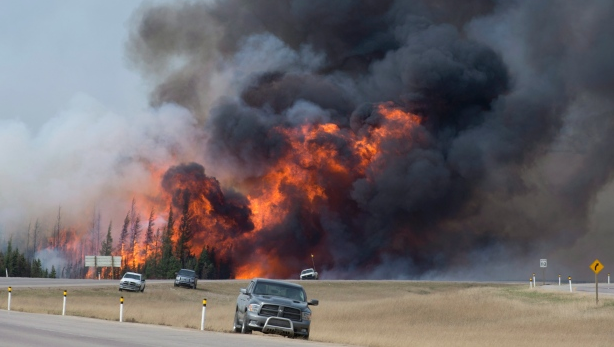Editor’s Note: The following is an opinion article.
Wildfires, oil spills, opiate crises, oh my! While Trump debauchery and Kardashian scandals have flooded news outlets over the past month, there’s still a world beyond the mainstream media that goes unnoticed – and, arguably worse, unreported.
Though Pascack Hills students are generally more informed than the average American teenager, there are still a lot of notable events that mainstream news outlets and social media alike either sweep under the rug or neglect to report. If national breaking news emerges that would directly affect Americans, it would take precedence over a minor foreign conflict or a story that doesn’t directly impact viewers.
Fort McMurray Wildfire
While the month of May has brought New Jersey weather fit more so for the rainy April, we are much more fortunate than many Canadians who have been forced to literally build a new life from the ashes of their old one. A state of emergency was declared on May 1 in an area miles away from the blue collar city of Fort McMurray, Alberta. Two days later, the fire entered residential neighborhoods, burning nearly 2,500 buildings, causing two fatalities.
Not only is this the largest wildfire evacuation in the history of Alberta, it also has the potential to be the most costly disaster in Canada’s history, with well over a million acres of land engulfed by the fire. A main reason the news has likely not reported on this is because of our lack of involvement; though the United States, along with many other powerful nations such as Australia and Russia, has offered to help. Prime Minister Justin Trudeau has declined these offers, stating that Canadian wildland firefighters have the problem under control.
Unfortunately, as of May 23, the wildfire is still spreading, now entering the forests of northern Alberta and neighboring province Saskatchewan.
To learn more about the Canadian Wildfires, click here.
Gulf Of Mexico Oil Spill… Again
Almost 90,000 gallons of oil – nearly seven completely filled swimming pools – were leaked into the Gulf of Mexico, making it the first major oil spill of the year thus far. Though BP is not to blame, gasoline company Royal Dutch Shell, commonly known as Shell, is believed to be at fault. On May 11, a pipeline leaked oil just 90 miles from the Louisiana coast. It wasn’t noticed until a helicopter spotted the spill a week later.
The surface of this region of the gulf is covered by oil spans close to 30 square miles – nearly one and a half times the size of the island of Manhattan. According to science publication Tech Insider, “…the US Coast Guard and Royal Dutch Shell skimmed the site, recovering 51,000 gallons of oily water.”
Though the spill pales in comparison to the 2010 BP Oil Spill, and seems to not have affected wildlife yet, many are still confused as to why we haven’t heard about it.
Sophomore Logan Harris said, “Garbage is making headlines and the news is about getting information about the world so we can better our planet… I would have much rather learned about this over watching another presidential antic.”
To learn more about the Oil Spill, click here.
Opiate Crisis
Argentine-American David Pakman, creator of the award-winning David Pakman Show, did an excellent piece on a field few of us have knowledge on: opiates. An opiate, by definition, is “a drug with morphine-like effects, derived from opium.”
Though cities such as Boston and Providence have seen spikes in opioid usage in the past decade, underprivileged countries in Asia, Africa, and Latin America are having a completely different problem. While we have too many strong pills that lead to addiction and, in some cases, deaths, these poverty-stricken areas can’t obtain a pill stronger than a measly Tylenol.
These countries struggle to meet the global standards set by the International Narcotics Control Board (INCB) because of international regulation laws set by the INCB. These laws state that opiates can only be prescribed by a doctor – what the INCB policy fails to address is that, unfortunately, these regions are lacking in general practitioners, but instead have an abundance of registered nurses. Unfortunately, as previously mentioned, nurses lack the authority to prescribe opiates to patients.
To learn more about the Opiate Crisis, click here.











































